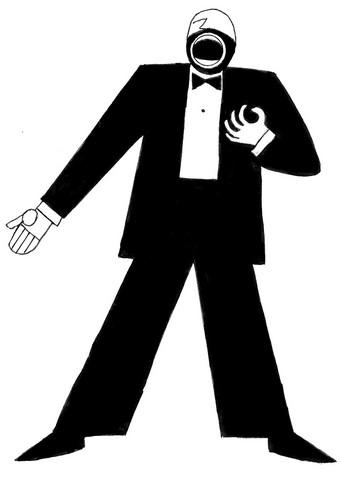The Rose, the Lily and the Whortleberry
Although there are a lot of classical music events going on in and around Philadelphia, and the critics from the local dailies no doubt have to pick and choose which concerts to attend, I was somewhat surprised to see the appearance of the Orlando Consort at Haverford College this past weekend pass by with little to no coverage. One would think that a world class vocal ensemble performing in Philadelphia for the first time in some years would warrant some attention. In fact the only mention in the Inquirer, in a weekend arts preview, was erroneous, implying that the Orlando Consort was an instrumental group (click here for the link). I guess, to be fair, because the concert was part of Haverford's concert series and not part of the Philadelphia Chamber Music Society or Kimmel Center Presents it was not afforded the luxury of a massive advertising campaign. Still, the advertising couldn't have been all bad; I became aware of the concert after hearing about it on WRTI.
This was not my first Orlando Consort concert experience (try saying that five times fast). I saw the group in York Minster Chapter House last year in, if I recall correctly, a medieval mass reconstruction. That environment was much more conducive to the Consort's sound than the somewhat dry acoustic of Haverford's Marshall Auditorium, though that concert featured slightly different personnel than normal. I remember enjoying the York concert, but was not blown away. I felt kind of the same way about this one.
The program was a fairly interesting tour of Medieval and Renaissance music dealing with gardens and flowers (hence the title of this posting which was also the title of the concert). Each singer introduced a set which allowed the audience to know more about the forthcoming music as well as humanising the singers. A nice touch I thought. The group took a bit of time to adjust to the hall, suffering a few minor intonation and blending issues at the start. The overall sound was very good -- crisp and clean from each member of the quartet. Many of the pieces featured duos or trios which showcased individual members. The singers shone most brightly in the more homophonic pieces such as Brumel's "Sicut lilium", where they could focus on blend and illustrating the text.
After the interval, I moved upstairs to the balcony for a different sonic perspective. Not surprisingly, the overall sound of the group was more evenly blended and not as top heavy as it seemed downstairs (which isn't a terrible thing with this group, as alto Robert Harre-Jones has a stunning voice). The highlight of the concert for me were two pieces from the Franco-Flemish Renaissance by Clemens non Papa and Nicolas Gombert. These beautiful settings of the Song of Songs combine a madrigalian lushness and sensuality with the smooth polyphony of the church. The singers responded to the texts with lovely tone, sensitivity and communication.
If only more people had shown up...


0 Comments:
Post a Comment
<< Home